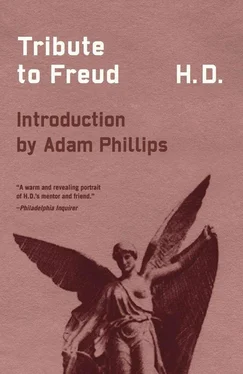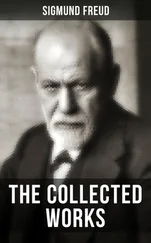It was the very love of humanity that caused the Professor to stand guardian at the gate. Belief in the soul’s survival, in a life after death, wrote the Professor, was the last and greatest fantasy, the gigantic wish-fulfillment that had built up, through the ages, the elaborate and detailed picture of an after-life. He may even have believed this. If so, it was proof again of his Centurion courage. He would stand guardian, he would turn the whole stream of consciousness back into useful, into irrigation channels, so that none of this power be wasted. He would clean the Augean stables, he would tame the Nemean lion, he would capture the Erymanthian boar, he would clear the Stymphalian birds from the marshes of the unconscious mind. These things must be done. He indicated certain ways in which they might be done. Until we have completed our twelve labors, he seemed to reiterate, we (mankind) have no right to rest on cloud-cushion fantasies and dreams of an after-life.
From the reasoning upper layers of the thinking mind, he would shut off this dream of heaven, this hope of eternal life. Someone writes somewhere of Sigmund Freud’s courageous pessimism. He had little hope for the world. He knew why people laughed at his first findings, at his Interpretation of Dreams, his Delusion and Dream, and the rest of them. He answered his first ribald detractors with his essay on wit and humor — I think it is impossible to assess this or appreciate it in the translation — but even a superficial observer of his manner of approach to his antagonists would have to grant that the foil of his wit, given a worthy adversary to measure it by, would have none to rival it. He did not wish to prove people wrong, he wanted only to show them the way and show them that others had imposed ideas on them that might eventually prove destructive. He even wrote a later, reasoned, calm, and dispassionate essay on the causes for the resurging hatred of the Jews.
There was another Jew who said, the kingdom of heaven is within you. He said: unless you become as little children you shall not enter into the kingdom of heaven.
Others abide our question. Thou art free.
We ask and ask — Thou smilest and art still,
Out-topping knowledge. For the loftiest hill,
Who to the stars uncrowns his majesty,
Planting his steadfast footsteps in the sea,
Making the heaven of heavens his dwelling-place,
Spares but the cloudy border of his base
To the foil’d searching of mortality;
And thou, who didst the stars and sunbeams know,
Self-school’d, self-scann’d, self-honour’d, self-secure,
Didst tread on earth unguess’d at. — Better so!
All pains the immortal spirit must endure,
All weakness which impairs, all griefs which bow,
Find their sole speech in that victorious brow.
I was impelled (almost compelled) to copy this out. It is, of course, Matthew Arnold’s familiar sonnet to Shakespeare. I had not intended to include it in these notes, but perhaps my subconscious or unconscious mind recognized an intellectual family-likeness in “that victorious brow.” And in this very last line, there is a sort of Elizabethan conceit or posy, a hidden reference — a purely personal finding, but for our purpose curiously compelling. We have victorious or victory, Sieg, and the sole voice, the voice, or speech, or utterance, Mund, Sigmund. There is this, this sonnet, as if written for us, for this occasion, for this memoir and there is the more personal lyric of the German poet, Goethe, to which I have referred earlier in these notes. I cannot recall the musical setting — not Schumann’s — that I and a group of my contemporaries sang as school-children. But about the Professor, there was music certainly; there was music in every syllable he uttered and there was music implicit in his name, the Sieg-mund, the victorious voice or utterance. There had been music everywhere in Vienna, there was Beethoven, surcharged and tortured with his symphonies, Mozart, frail and impeccable and deserted and early dead. There was Schumann, of course, and Schubert’s name was especially associated with the village or suburb of Grinzing, not far from Döbling where the Professor had his summer-quarters that first year I was in Vienna. There was the city acclaimed by the world as the heart and center of music and music-lovers. And here was the master-musician, he, too, a son of Apollo, who would harmonize the whole human spirit, who like Orpheus, would charm the very beasts of the unconscious or subconscious mind, and enliven the dead sticks and stones of buried thoughts and memories.
“By chance or intention,” I began these notes on September 19th, a day sacred to Thoth and later to St. Januarius, a name affiliated with that of the Roman Janus, patron of gate-ways and portals, guardian of all “beginnings.” I did not consciously select this date, though, as I glance at the calendar from time to time, my subconscious mind might have guided me to it. But by quite definite “intention,” I will finish these “beginnings,” as for November 2nd, the day of the lighting of the candles for the souls of the Dead.
This is the evening of All Hallows, Halloween; so tomorrow is the first of November 1944, All Saints Day. The angel Michael of the old dispensation, the archangel Michael of the Revelation, is regent of the planet still called Mercury. And in Renaissance paintings, we are not surprised to see Saint Michael wearing the winged sandals and sometimes even the winged helmet of the classic messenger of the Gods. But for the Professor, I choose rather the day following All Saints Day. He was more interested in souls than saints.
One of these souls was called Mignon, though its body did not fit it very well. It was small, mignonne, though it was not pretty, they said. It was a girl between two boys; but, ironically, it was wispy and mousy, while the boys were glowing and gold. It was not pretty, they said. Then they said it was pretty — but suddenly, it shot up like a weed. They said, surprised, “She is really very pretty, but isn’t it a pity she’s so tall?” The soul was called Mignon, but, clearly, it did not fit its body.
But it found itself in a song. Only the tune is missing.
In the last verse of this lyric of Johann Wolfgang Goethe is the line,
Es stürzt der Fels,
the rock breaks or falls in ruins, and indeed this is our very present predicament; but
und über ihn die Flut
following, gives the impression of a living river; though “and over it the flood” is the literal rendering. Ruins and the flood, but there remains our particular Ark or Barque — a canoe, I called it — that may, even yet, carry us through the seething channels to safe harbor. The Mignon of Goethe’s lyric herself joins us in our ritual of question and answer. There were the question marks, as I called them, the series of the imperfect, reversed S of the scroll-pattern of the writing-on-the-wall in the Greek island of Corfu, in the spring of the year 1920. There was the S or the serpent of my original corner-stone, the enigmatic symbol that a childhood friend, my first “live” poet, Ezra Pound, translated for me. There was the S as serpent, companion to the thistle, the symbol that suggests waste places and the desert; but we have been told that the desert shall blossom as the rose, and it was in the desert that Moses raised the standard, the old T or Tau-cross of Thoth of the Egyptians. The Professor had been working on a continuation of his “Moses, the Egyptian” theme, though we had not actually discussed this when I had my “real” dream of the Egyptian Princess. The Professor asked me then if I were the child Miriam who in the Doré picture had stood, half-hidden in the river-reeds, watching over the new-born child who was to become leader of a captive people and founder of a new religion. Miriam? Mignon?
Читать дальше











